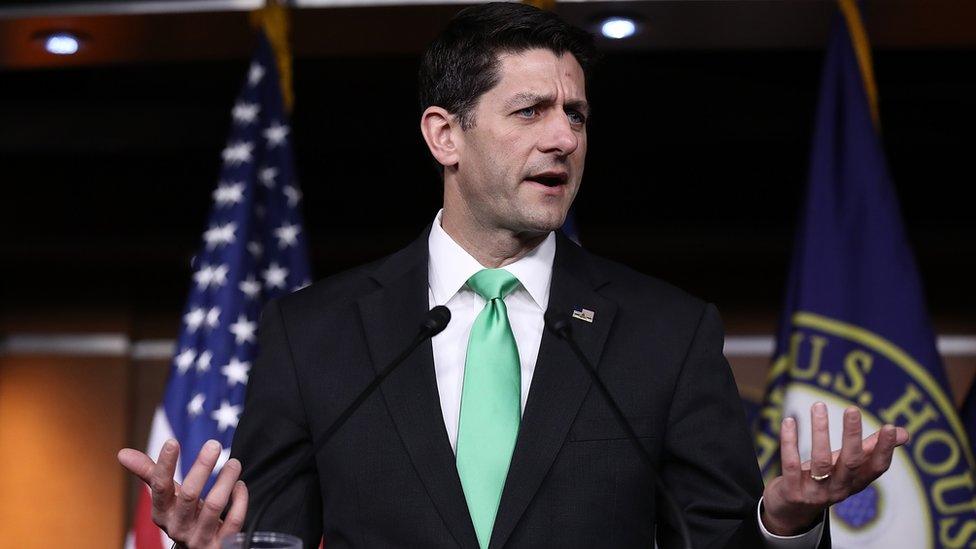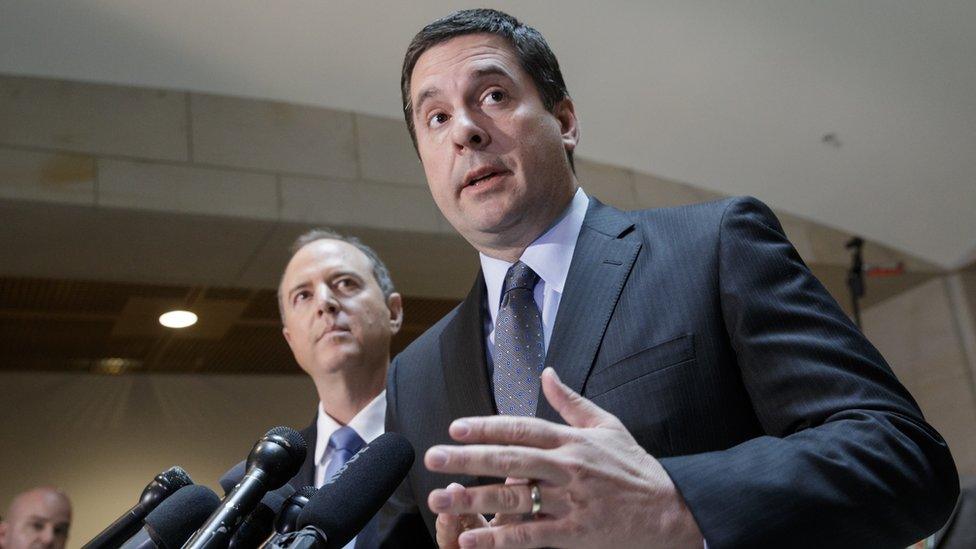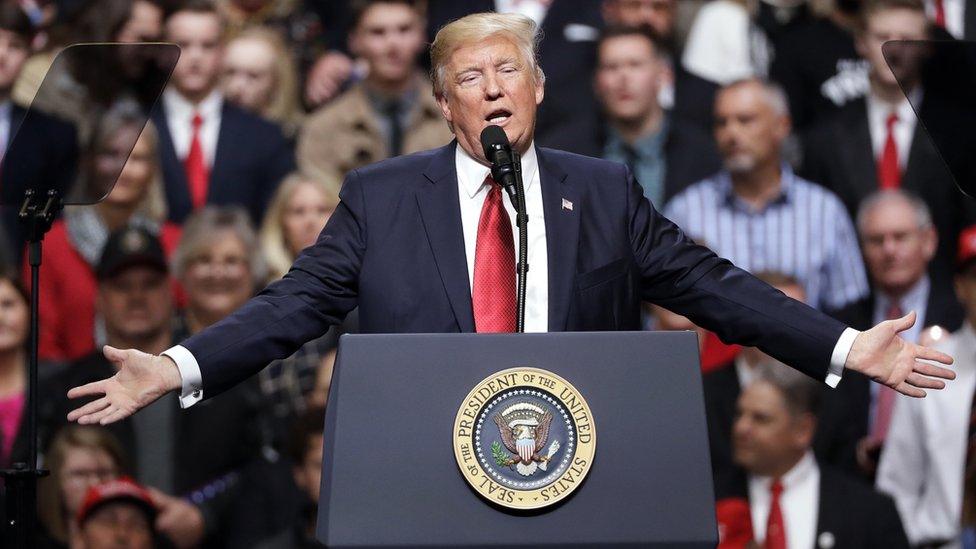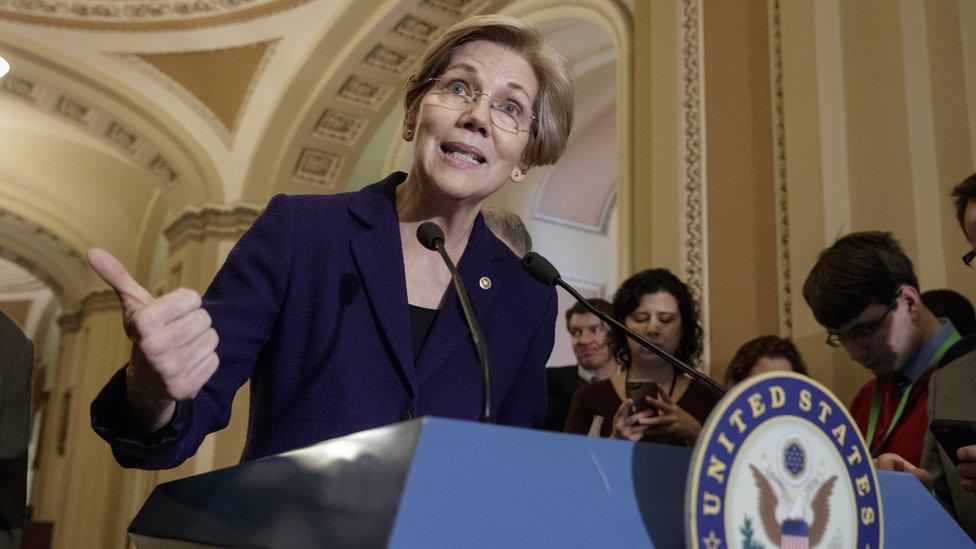Have Republicans forgotten how to govern?
- Published

On election day last year, American voters gave the Republicans a powerful gift - unified control of the presidency and Congress for the first time in a decade. But turning a governing majority into enacted policies is proving to be a challenge for a party that spent the past eight years throwing political bombs from the sidelines.
Speaker of the House Paul Ryan took to the lectern for a press conference on Thursday morning facing a crisis. The healthcare reform legislation he has tried to shepherd through Congress is in serious peril.
Conservative members of his chamber, like Dave Brat of Virginia, were savaging the legislation for not fully dismantling the existing Obamacare system.
Moderates and even some middle-of-the-road Republicans, like Florida's Ileana Ros-Lehtinen, said they could not support it because cuts to the Medicaid programme for the poor were too severe.
Mr Ryan has been forced to walk a political tightrope, balancing the competing and often conflicting interests in his caucus in an attempt to get the first step in a multi-part reform effort through the House.
It is a feat that will require a combination of diplomatic finesse, political muscle, relentless focus and more than a bit of luck.
Trump's wiretap saga explained in two minutes
That's not what reporters wanted to talk about, however.
Instead, the first question was about Donald Trump's allegation - and continued insistence - that his communications had been monitored by Barack Obama's White House during the 2016 presidential campaign.
And therein lies the heart of the problem facing conservatives just a few months into the Trump presidency. At a time when a concerted political effort on the part of Republican leadership in Congress and the White House is essential to the success of a key part of their agenda, distractions and dissent rule the day.
While Mr Ryan is undertaking his juggling act, the president seems intent on throwing baseballs at his head.
Time and again the president has undermined Republican political priorities with off-message comments and tweets.
Behaviour that helped throw opponents off-balance and demonstrate his unorthodoxy during the campaign are proving less helpful when conducted from the confines of the White House.
Mr Trump's remarks about wiretapping and earlier allegations of widespread voter fraud, wholly unnecessary given his victory last November, have forced the White House to scramble with after-the-fact explanations and thrown unwelcome obligations on congressional Republicans to conduct investigations.
On Wednesday, a visibly frustrated Devin Nunes, chair of the House Intelligence Committee and Trump ally, straight-up said Mr Trump was "wrong" about the surveillance.
The Senate Intelligence Committee would later issue a statement that they found "no indications of monitoring Trump Tower by any element of the United States government".
Mr Trump's own words, as well as statements made by his advisors since inauguration day, also helped torpedo the president's second effort at instituting a travel ban on some majority Muslim nations.

House Intelligence committee chair Devin Nunes (foreground) and the committee's ranking Democrat, California's Adam Schiff, said there was no evidence of Trump's wiretapping claims
"The record before this court is unique," wrote the federal judge who suspended the travel order on Wednesday. "It includes significant and unrebutted evidence of religious animus driving the promulgation of the executive order and its related predecessor."
Even without the travel ban and wiretapping controversies roiling Washington politics, Republicans were going to have a challenge transitioning from being the party of opposition, intent on thwarting the efforts of the Obama administration, to the party of action.
While it was easy for the conservatives in Congress to pass straight-up Obamacare repeal legislation when they knew Mr Obama would veto it, crafting legislation that the party has to stand behind - and explain to voters in coming elections - is much trickier.
During a Wednesday night televised town hall forum on healthcare there was a telling moment when Health and Human Services Secretary Tom Price listened to a cancer patient lament that he would lose his medical coverage under the Republican plan.
Mr Price's response was to criticise past Democratic promises on healthcare.
The questioner wasn't buying it. Republicans have to come up with solutions now, not just identify problems.
As any Democrat in office during the past eight years will explain, saying "our plan is less bad than the existing system" isn't a recipe for political success.
Yes, it's still the first few months of the Trump presidency, and the drive to pass something, anything on healthcare after eight years of promises will be strong.
Mr Trump could find new focus and use some of his much-advertised dealmaking acumen to pull competing factions within the Republican Party together. His party has the votes in Congress to get things done, and with a bit of positioning he could put significant pressure on Senate Democrats up for re-election next year in states he carried in 2016.

Trump back in rally mode, this time with the seal of the president
Then again, Mr Trump has shown few signs of easing back on his social media rants.
He says he will hold large public rallies every few weeks, where his unscripted comments often set off new controversies.
There also may be powers within the White House - such as senior advisor Steve Bannon - who would be happy if the Republican congressional agenda comes crashing down, bringing the remnants of the party's establishment with it.
For Republican congressional leadership, healthcare reform is only the first piece of the legislative puzzle. The longer that takes, the less time will remain for comprehensive tax reform, which has its own sticky political issues.
A massive budget fight, with the threat of a government shutdown, also looms on the horizon.
Mr Trump's aggressive funding priorities are already coming under fire. Democrats are digging in to defend social programmes on the chopping block.
Some Republicans object to billions of dollars for Mr Trump's border wall and sharp reductions in foreign aid and agricultural subsidies.
If negotiations over healthcare reform go south, Republicans in Congress will be less inclined to give Mr Trump the benefit of the doubt in the coming days. Democrats will smell blood, and the subsequent political lifts will be all the more difficult.

Democrats like Senator Elizabeth Warren have attacked the healthcare bill
By next year members of Congress will be focused on the coming midterm elections and less inclined to take risks on big legislative actions with uncertain prospects.
There's already evidence of a time bomb underneath the Republican Party. Polls show uneasy independents and near universal opposition to their agenda from Democrats, but for the time being their supporters held firm.
If those numbers dip, however, and enthusiasm diminishes, it could spell ruin for congressional Republicans in 2018.
Ever since Mr Obama swept to power with Democratic congressional majorities in 2008, Republicans have been promising their voters that real conservative change is just an election away.
Yes, they won the House of Representatives in 2010, but they still needed the Senate. Yes, they won the Senate in 2014, but the presidency was in Democratic hands.
Now they have Congress and the presidency, leaving few excuses. After two months of intra-party bickering and a president who can't keep his hands off his Twitter account, it may only be a matter of time before their base gets restless.
Conservative humourist PJ O'Rourke once quipped that "Republicans are the party that says government doesn't work, and then they get elected and prove it".
For the past few months that line has seemed less of a joke than a prophecy.